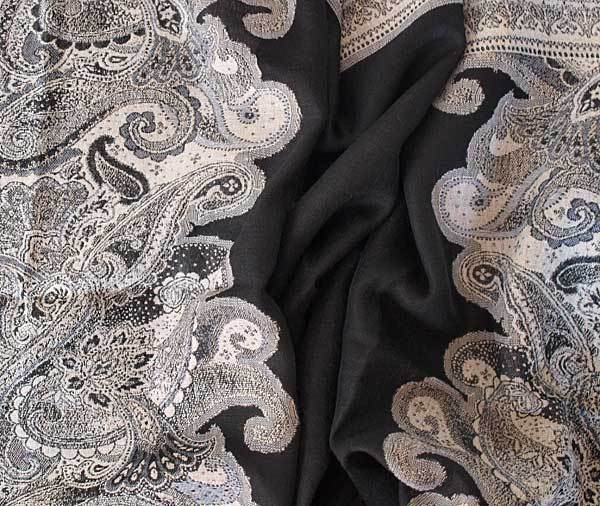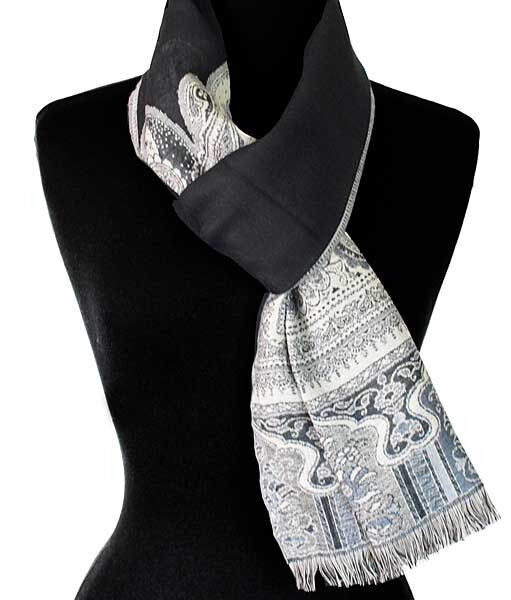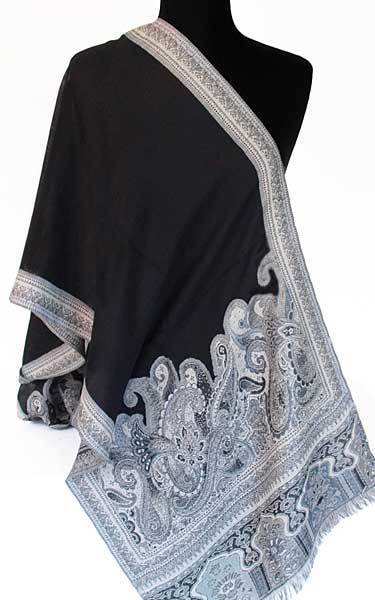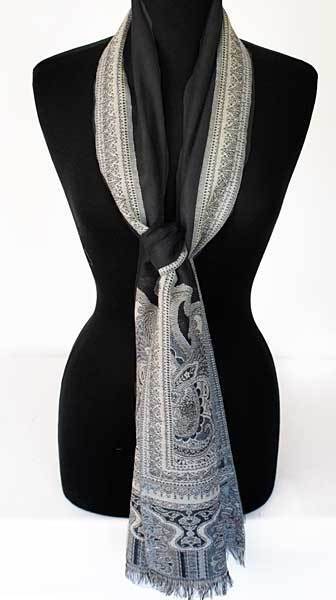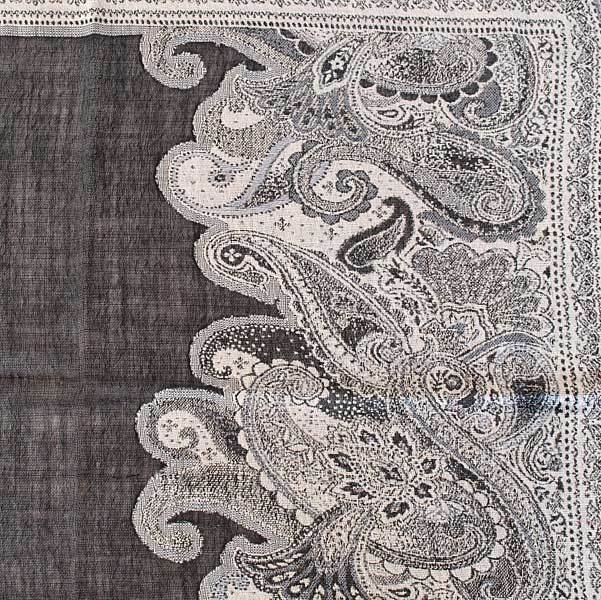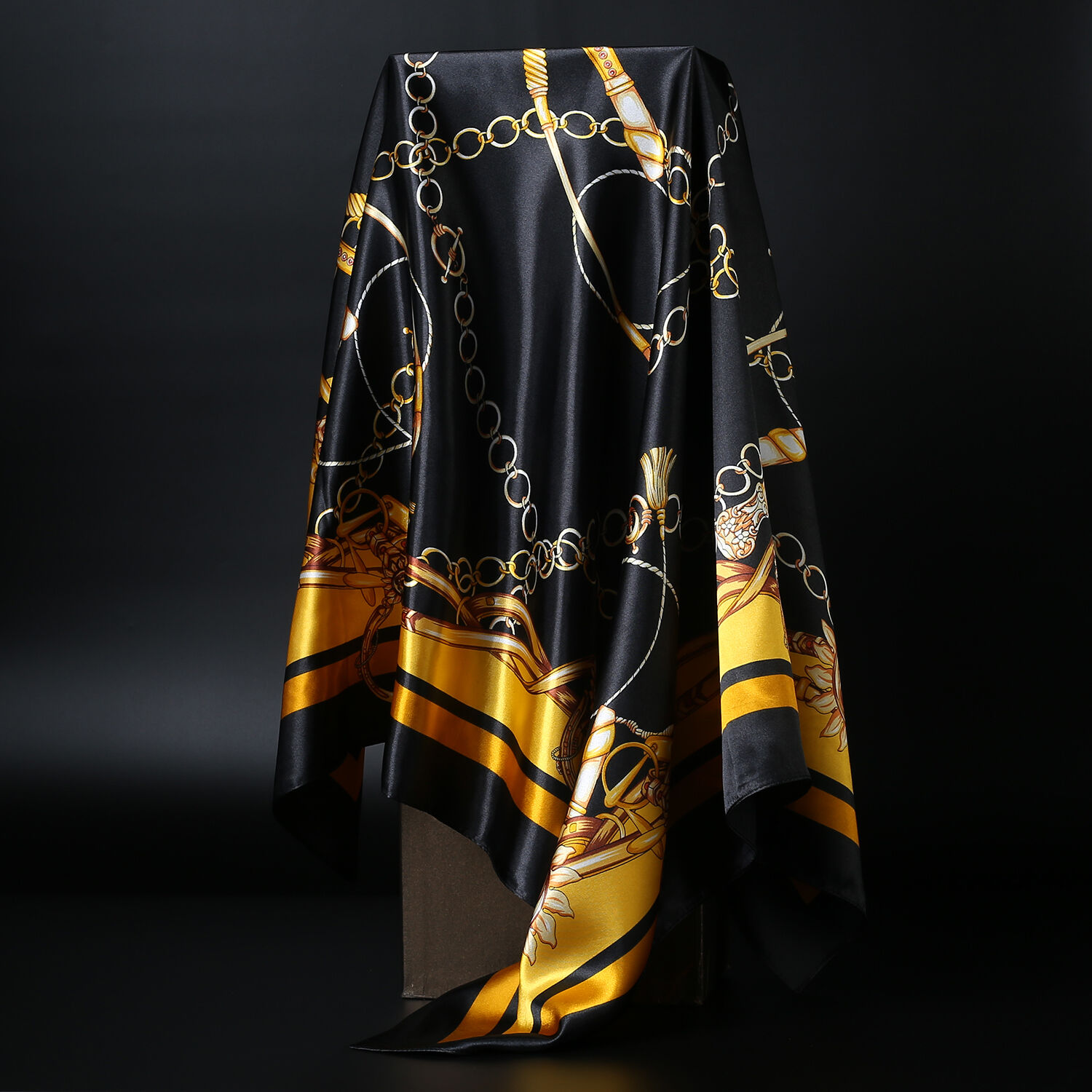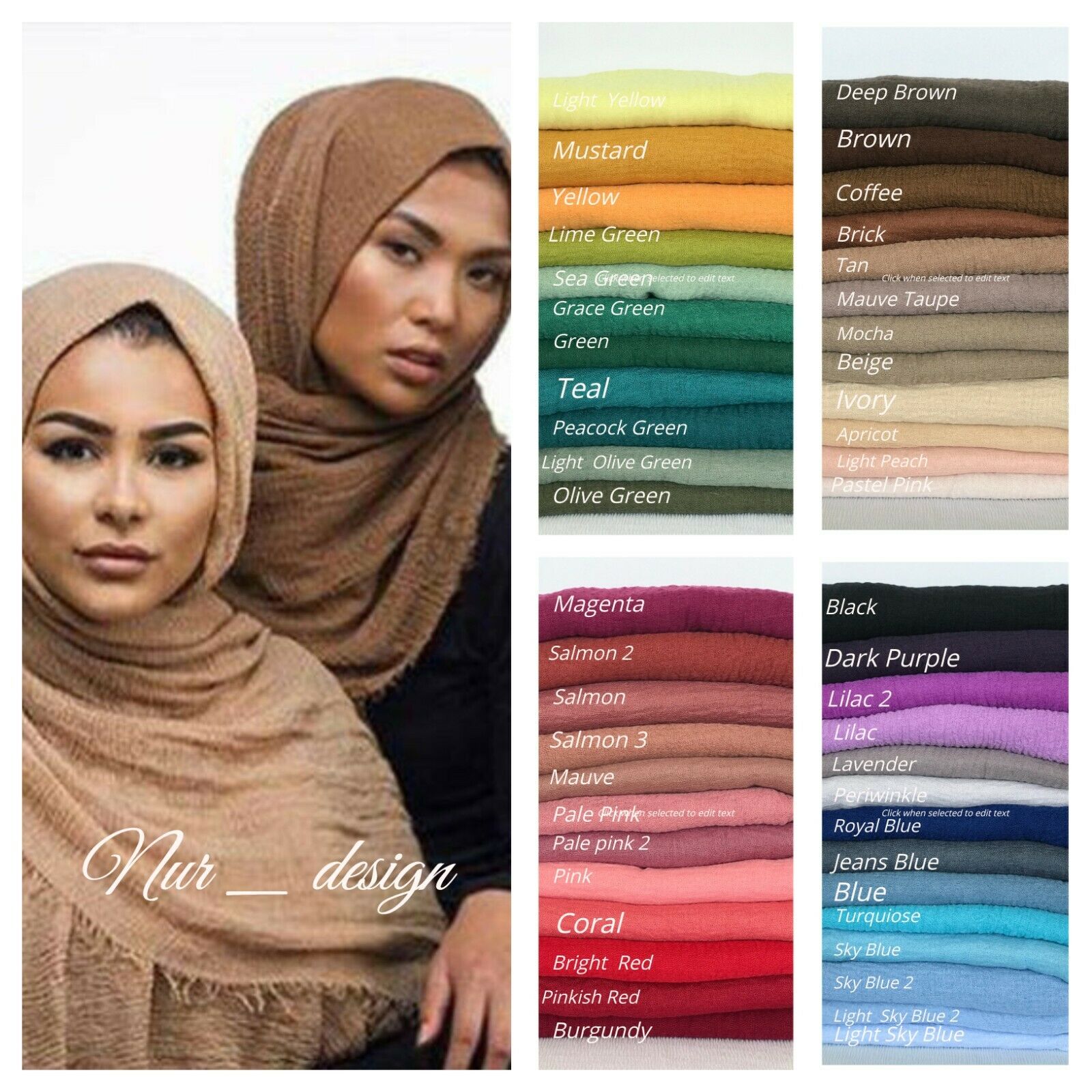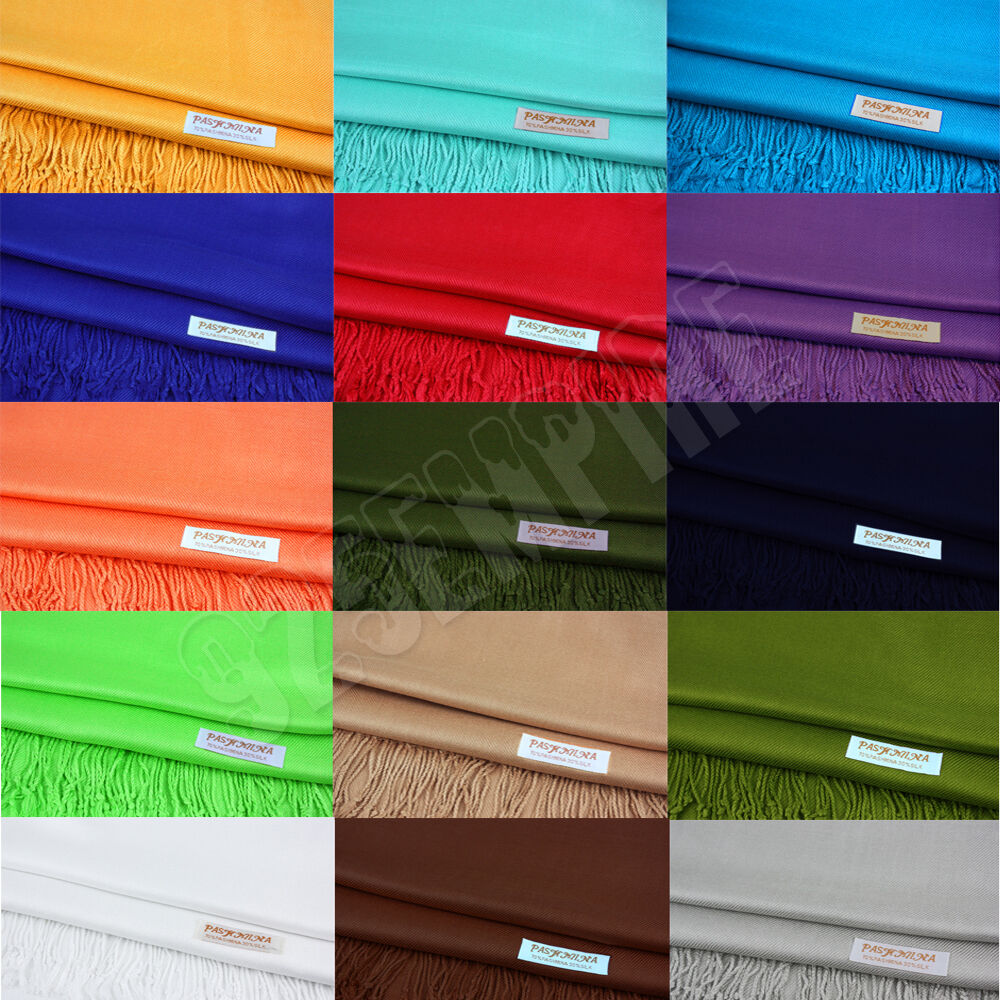-40%
Black & Shades of Gray Wool Jamavar Scarf Paisley Jamawar India Wrap Pashmina
$ 23.73
- Description
- Size Guide
Description
FileJamavar Scarf
From Heritage Trading Company
Traditional India motifs combined with colors that you'll wear every day make this a practical accessory with a touch of the exotic.
For more information about India shawls, please see the
Definitions and Comments
at the end of our listing.
This scarf is a dramatic example of a jamavar weaving technique in which the complex design is created using supplemental warp and weft threads. The large, solid color blocks are rather loosely woven. Extra threads are woven into the scarf at the patterned areas only. These supplemental threads do not extend beyond the edges of the intricate motifs.
A jamawar wool scarf from India. Jacquard-woven, Mughal pattern.
Use it as a winter scarf or a light shawl.
Fabric:
Wool
Principal Colors:
Black & Shades of Gray
Approximate Size:
75 Inches Long, 21 Inches Wide
Approximate Size:
190 Centimeters Long, 53 Centimeters Wide
This scarf is
brand
new
, not "vintage." In other words, it's not used, damaged, or dirty.
Wear this dramatic stole with plain slacks and blouse or a simply styled dress, and I guarantee, from experience, that even strangers will offer admiring comments.
This item is shipped from India. Please allow 2-3 weeks for delivery.
Outstanding Quality
Please see our feedback for comments like these on our
jamavar shawls
:
Apr-10-08
Praise
:
Unbelievable quality for next to no money. I will be back. THANK YOU
Sep-16-09
Praise
:
Superb item, with it I feel like a queen!!!
Apr-19-10
Praise
:
This shawl is a masterpiece.
Aug
-28-10
Praise
:
Each shawl lovelier than the last, best on ebay! cheers
Jan-08-11
Praise
:
What a piece of textile art! I am very impressed. Many thanks!
Mar
-08-11
Praise
:
Spectacular!!! Majestic!!!
Mar
-18-11
Praise
:
Tout simplement merveilleux, très heureuse Vendeur AAA+++
Jul-07-11
Praise
:
It's so beautiful!!!
Oct
-21-11
Praise
:
Bought for a gift, but it will be hard to give away! Beautiful! Great seller A+!
Nov-14-11
Praise
:
Amazing quality indeed and very soft. Thanks!
Dec-08
-11
Praise
:
Really beautiful jamavar shawl, so warm; Repeat buyer; Best on net! A+++ seller!
Dec-30-11
Praise
:
Gorgeous shawl, came much faster than expected. Ecstatic repeat customer!
Jan
-15-12
Praise
:
Lovely, elegant shawl...beautiful craftsmanship!! Have several now, thanks!!
Feb-11-12
Praise
:
I continually shop at Heritage Trading because of the variety and quality!
Aug-24-12
Praise
:
Received in excellent condition. Thanks.
Aug-28-12
Praise
:
Just as described, lovely, and fast shipping, too! Thanks!!!
International Buyers - Please Note
Import duties, taxes, and charges are
not included
in the item price or shipping cost. These charges are the buyer's responsibility.
Please check with your country's customs office to determine what these additional costs will be prior to bidding or buying.
Customs activity may delay the arrival of your package. In our experience, this is infrequent, but it does sometimes happen. Thanks for your patience.
POUR NOS AMIS QUI PARLENT
FRANÇAIS
(For our French-speaking friends):
Châle ou écharpe
en laine. Nouveau. Fabriqué en Inde. (Méthodes de paiement: Nous acceptons les cartes de crédit sur Paypal et les chèques personnels en U.S. dollars.
Livraison: Demandez les frais de livraison en dehors des Etats-Unis.)
Gift Wrap Pouch
Made of sari fabric. It's easy, beautiful, and reusable. For any Heritage Trading shawl.
Only .99
Click
here
for details.
Truth In Advertising: Some Definitions & Some Comments About India Shawls
FIRST, THE DEFINITIONS
Jamavar Shawls
(Also spelled jamawar, jamavaar, jhamevar)
The jamavar technique of weaving intricate, Persian-inspired motifs was brought to the Kashmir region of India in the 15
th
Century under the patronage of one of the kingdom's most admired rulers, Zain-ul-Abdin. Patterns in these early jamavars were created by using weft threads of various colors that did not run the full width of the fabric. Rather, they were woven back and forth in small areas to create the desired, tiny color blocks. These jamavars became fashionable with European aristocracy in the 18
th
Century. Because of the costly weaving technique, the patterns often covered just the edges and ends of the shawls. Even so, only the wealthiest people could afford them. The invention of the jacquard loom in the 19
th
Century meant that shawls with the traditional jamavar designs could be produced cost-effectively for a much larger market. And the motifs began to cover larger portions of the shawls.
Madame Riviere, 1805, By Ingre
Countess Daru, 1810, By David
Early 19th Century Portraits Of European Ladies Wearing Jamavar Shawls
Today the term “jamavar” usually refers to shawls with intricately woven, Persian/Mughal-inspired patterns. (It rarely refers to the original weaving technique.) Some modern jamavars simulate earlier weaving traditions by using supplemental warp and/or weft threads, which extend across only a portion of the fabric, to create complex, multicolored designs on some areas of the shawl, while leaving large, solid color blocks in other areas.
Pashm*na
(In accordance with Ebay rules, we can't spell out this word, lest our auction appear in a search for articles made of that material. But we think you'll figure out our message anyway.)
NOT a generic term for any shawl from India,
“p*shmina”
refers to a very specific and very costly material.
"Pashm*na"
is the inner coat wool of a particular Himalayan goat (Capra hircus). Articles made from
"p*shmina"
are very expensive, even when purchased in India directly from a manufacturer’s agent. Less expensive are blends of
"p*shmina"
with other materials such as wool or rayon.
In our experience, it is not possible to make a wholesale purchase of 80 inch by 28 inch, jamavar, 70%
"p*shmina"
blend shawls from a manufacturer’s agent in India for less than (US currency) apiece. It is also not possible to circumvent the agents and buy directly from the manufacturers—we tried.
C*shmere
Also NOT a generic name for shawls from India,
“c*shmere”
is another name for
"p*shmina"
. Some people prefer to use the term
“cashm*re”
to refer to the larger diameter fibers (15-19 microns) and reserve the term
“pashm*na”
for the finer grade (11-14 microns).
Kashmir
A region of Northwest India. Not
"c*shmere"
fabric.
Kashmiri
The adjective meaning that something is “of Kashmir.” It can mean any shawl from Kashmir or designed in the tradition of Kashmir. It does not mean
"c*shmere"
material. The term is often used to refer to certain types of embroidery. In one popular type of Kashmiri hand-embroidery, the pattern is made from many tiny, straight stitches. Chain stitch is another traditional style. (Heritage Trading sells some shawls with Kashmiri embroidery.) Because of Kashmir’s current political instability, much Kashmiri embroidery is now done outside that state.
Viscose
Rayon. Viscose is the word much of the world uses to refer to what Americans call rayon. Read the fine print on shawl auctions. Some shawls described as
"pashm*na"
in the title are revealed to be 100% viscose in the small-font part of the description.
THE COMMENTS: TRUTH IN ADVERTISING
India does not have the strict truth-in-advertising laws that are found in the United States and elsewhere. Consequently, some Indian manufacturers will label their shawls as
"p*shmina"
or
"c*shmere,"
even though they are, in reality, sheep’s wool or even synthetic. In fact, we told our Indian supplier to remove the labels sewn into a recent shipment of woolen shawls, inaccurately describing them as
"pashm*na"
.
At Heritage Trading, we try to be clear and accurate in our ebay descriptions. We do not, at present, sell
"p*shmina"
or
"cashm*re"
shawls. We DO sell beautiful shawls with jamavar (i.e., intricately woven patterns) made of sheep’s wool. We also sell some wool-like, synthetic shawls, which are clearly described as synthetic in our listings. And we sell some blended fabrics, which are also fully described.
We encourage similar clarity and accuracy from all sellers.
Thanks for reading this. We wanted you to know.
J11-JS-122
